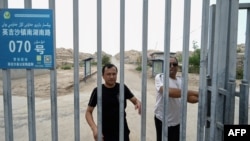UN Reveals China's Enforced Disappearances in Xinjiang
The U.N.'s Working Group on Arbitrary Detention has exposed further evidence of China's enforced disappearance practices in Xinjiang, particularly focusing on the plight of Uyghurs and other Muslim minorities in the region. Recent findings from the working group highlight the arbitrary nature of detentions, unfair trials and secrecy surrounding those who have disappeared, pointing toward China's potential breach of international human rights standards and involvement in crimes against humanity. China denies carrying out human rights abuses in the region and has labeled camps in Xinjiang “vocational education and training centers.”
Uyghurs Abroad Grapple with China's Coercive Tactics
Confronted with surveillance, internment, and domestic repression, a substantial number of China's Uyghurs have sought refuge abroad. Nevertheless, escaping China does not guarantee safety, as many discover. VOA's investigation delves into the strategies employed by the Chinese government to extend its influence beyond its borders, utilizing diplomacy, economic leverage and international organizations to target political adversaries even in foreign lands.
Rights Groups Renew Call for Extensive Investigation of China's Human Rights Abuses
On the anniversary of a U.N. report on the human rights situation in Xinjiang, Amnesty International and Human Rights Watch highlight the international community's inadequate response to hold China accountable for possible crimes against humanity. The U.N. report revealed grave violations by China against Uyghurs and other Muslim minorities in the region, including mass internment and torture. The rights groups urged national and international officials to use their offices to push for a change in China’s repressive policies.
Uyghur Bombing Suspects Return to Bangkok Court After Delay
Two Uyghur suspects in the 2015 Bangkok bombing have returned to court after a nine-month delay, one in a wheelchair due to deteriorating health after eight years of confinement. Adem Karadag and Yusufu Mieraili, arrested for the Erawan Shrine attack that killed 20 and injured 100, raised concerns about conditions and halal food in military detention. The ongoing trial, still in the prosecution phase, could take about five years, highlighting the challenges Uyghur detainees face amidst complex legal proceedings.
Uyghur Train-Maker Arrested by Chinese Authorities During Visit to Xinjiang
Qahar Eli, a Uyghur design director working for a Chinese locomotive manufacturer in Turkey for over a decade, was arrested by Chinese authorities in Xinjiang during a family visit in March. Despite having a Chinese passport and having previously visited his hometown, this time he was detained. His employer, CRRC Zhuzhou Locomotive Co., confirmed his captivity, categorizing it as a criminal case. Eli's disappearance follows rising calls for accountability for China's repression of Uyghurs in Xinjiang.
Rights Group Urges Tourism Firms to Stop Providing Trips to Xinjiang
Uyghur Human Rights Project (UHRP), a rights group based in Washington, urged western tourism companies to stop offering package holidays that include travel to Xinjiang, where allegations of human rights abuses amounting to genocide have emerged. UHRP released a report emphasizing the danger of such tourism normalizing Chinese government policies aimed at erasing the Uyghur identity. The report highlights seven travel companies with tours to Xinjiang, some of which offer problematic experiences like visits to Uyghur homes, contributing to the erasure of Uyghur culture.
US Customs: 27% of Garments Linked to Xinjiang Cotton, Uyghur Forced Labor
U.S. Customs and Border Protection conducted tests on shoes and garments collected in May, revealing that 27% of them were linked to banned Xinjiang cotton due to concerns about forced labor involving Uyghurs. To accurately trace the cotton's origin, customs officials employed isotopic testing. Out of the 37 items tested, 10 were found to be consistent with Xinjiang cotton. These results underscore the challenges in enforcing the ban on products originating from Xinjiang, where Uyghur forced labor concerns persist.
News in brief
After returning from the BRICS summit in South Africa on August 26th, Chinese President Xi Jinping swiftly convened a meeting in Urumqi to receive updates from Chinese authorities in Xinjiang. This marked his third visit to Xinjiang during his 10-year presidency and followed a 2022 trip, which closely coinciding with a U.S. law targeting Uyghur forced labor product imports. This time, Xi stressed the alignment between Xinjiang's stability and economic growth, underlining the role of stability in fostering development. Ilshat Hassan Kokbore, an American Uyghur political analyst, noted Xi's continuity in focusing on economic development and assimilation. Xi also emphasized building a shared Chinese identity, prioritizing unity, and strengthening the common national narrative, including promoting education in the national language. This stance echoes traditional Chinese ideology emphasizing uniformity, according to Kokbore. During Xi's recent speech in Urumqi, he spoke of upholding the rule of law and utilizing legal mechanisms to enhance governance standards and ensure stability. However, critics argue that China's legal system often serves the government's agenda over safeguarding rights.
Quote of note
"There is a neglected point regarding CCP Xinjiang policies. The majority of the Chinese population's view is that only [in] a place [that] looks more Chinese, [do] they feel more safe. In this regard, I want to say that the Chinese traditional ideology, Confucianism, doesn't like diversity, it emphasizes the great uniqueness of Confucianism, and its universality, which still has a great impact on CCP leadership, also the Chinese population. That's why I say Xi's speech isn't new, it was the nationalist government's policy, also was the policy of Mao; since Xi came to power, he intensified the policy with violence and brutality."
— Ilshat Hassan Kokbore, an American Uyghur political analyst and vice chairman of the executive committee of the World Uyghur Congress told VOA.




